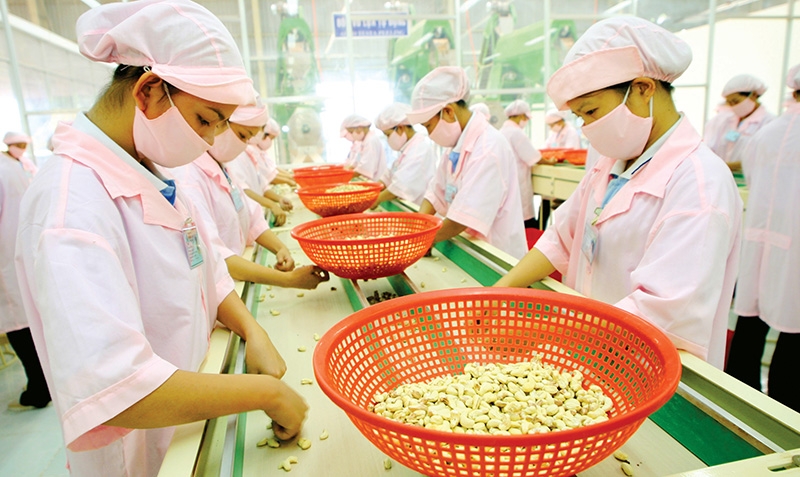Brits shopping for agri-aqua products
 |
| The speedy conclusion of a Vietnam-UK free trade deal offers a boost for agricultural trade in particular, photo Le Tien |
Vietnam and the UK signed the deal on December 29, and it came into force just days later. On the back of the speedy deal, trade between Vietnam and the UK will continue to enjoy preferential treatments even after the UK’s exit from the EU, as the UK-Vietnam Free Trade Agreement (UKVFTA) is intended to replicate the benefits of the EU-Vietnam FTA. Among them, agricultural goods represent some of Vietnam’s biggest exports to the UK that will enjoy major tariff reductions.
According to the Ministry of Industry and Trade, the UK is deemed a potentially big market for Vietnamese rice. Vietnam’s rice exports to the UK have skyrocketed, with a growth rate of up to 376 per cent in 2019. Nevertheless, it only accounts for a tiny 0.2 per cent market share in the UK market.
A representative of VRICE International Co., Ltd. pointed out that the UK is a demanding market with high tariffs and requirements for agricultural products. “Exporters need to fulfil a series of global standards and follow the certain protocols in line with US and the EU requirements, as well as ensure human rights for workers are protected and respected before becoming eligible for exports to the UK,” the representative explained.
Due to these high criteria, Vietnamese rice is less competitive than from other markets like India, Pakistan, and Thailand. “However, Vietnam and the UK will continue to enjoy preferential trade benefits with major tariff reductions under the UKVFTA. Thus, VRICE is drawing up a plan to boost its export volume to the UK,” he said.
Pham Thai Binh, general director of Trung An Hi-Tech Farming JSC, told VIR that Vietnamese rice exported to the UK was previously subject to tariff rates of 17 per cent, making it difficult for Trung An to penetrate the market. “However, now that the UKVFTA is implemented, there will be huge opportunities for Vietnamese exporters to grow their market share. In particular, the UK does not impose import quota on rice so Vietnamese exporters can ramp up investment,” Binh explained.
He noted that Trung An is looking for a local partner to distribute its ST20 fragrant rice to the new market.
Similarly, the UKVFTA is expected to be a major boost to Vietnamese seafood products. Truong Dinh Hoe, general secretary of the Vietnam Association of Seafood Exporters and Producers (VASEP), said that several companies are anticipating a sharp rise in aquatic exports to the UK following the pandemic and the implementation of the UKVFTA as tariffs on aquatic products fall from 10-20 per cent to zero.
He noted that the UK market accounts for 4 per cent of Vietnam’s aquatic export turnover. Vietnamese aquatic exporters highly appreciate the UKVFTA, which effectively preserves the UK-Vietnam preferential trading terms available under the EVFTA. Thus, they will have fewer disruptions in exporting products to the UK market following the UK’s exit from the EU’s single market.
Ho Quoc Luc, chairman of the board at shrimp exporter Sao Ta Food JSC, said that the company has plans to mobilise all its resource to capitalise on the opportunities from the UKVFTA. Sao Ta is focused on improving its shrimp raising capacity and sourcing materials to meet the requirements of the UK market, which is one of its key export markets for the company.
In addition to shrimp, Vietnam’s basa fish exports to the UK are predicted to surge following the UKVFTA, according to a VASEP report. In the first 11 months of 2020, Vietnam exported $60.15 million of basa fish to the UK, up 48 per cent against last year. The UK market has been in the spotlight for Vietnam’s basa fish sector with positive growth in the midst of the pandemic, and Vietnamese exporters offer affordable prices and many of them meet the UK’s quality standards.
What the stars mean:
★ Poor ★ ★ Promising ★★★ Good ★★★★ Very good ★★★★★ Exceptional
Related Contents
Latest News
More News
- Hermes joins Long Thanh cargo terminal development (February 04, 2026 | 15:59)
- SCG enhances production and distribution in Vietnam (February 04, 2026 | 08:00)
- UNIVACCO strengthens Asia expansion with Vietnam facility (February 03, 2026 | 08:00)
- Cai Mep Ha Port project wins approval with $1.95bn investment (February 02, 2026 | 16:17)
- Repositioning Vietnam in Asia’s manufacturing race (February 02, 2026 | 16:00)
- Manufacturing growth remains solid in early 2026 (February 02, 2026 | 15:28)
- Navigating venture capital trends across the continent (February 02, 2026 | 14:00)
- Motivations to achieve high growth (February 02, 2026 | 11:00)
- Capacity and regulations among British areas of expertise in IFCs (February 02, 2026 | 09:09)
- Transition underway in German investment across Vietnam (February 02, 2026 | 08:00)

 Tag:
Tag:




















 Mobile Version
Mobile Version